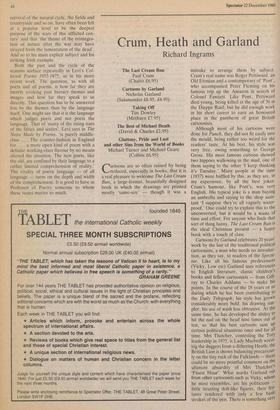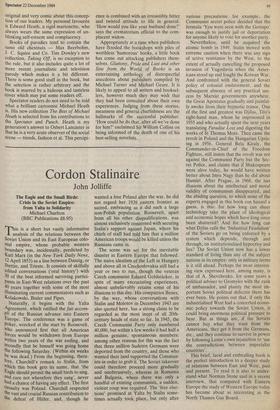Crum, Heath and Garland
Richard Ingrams
The Last Cream Bun Paul Crum (Chatto £8.95) Cartoons by Garland Nicholas Garland (Salamander £8.95, £4.95) Taking Off Tim Dowley (Methuen £7.95) The Best of Michael Heath (David & Charles £2.95) Gluttony, Pride and Lust and other Sins from the World of Books Michael Turner and Michael Geare (Collins £6..95)
rlartoons are so often ruined by being N.–../reduced, especially in books, that it is a real pleasure to welcome The Last Cream Bun, a large-format, beautifully designed book in which the drawings are printed mostly 'same-size' — though it was a
mistake to arrange them by subject. Crum's real name was Roger Pettiward, an Old Etonian and a contemporary of 'Pont', who accompanied Peter Fleming on his famous trip up the Amazon in search of Colonel Fawcett. Like Pont, Pettiward died young, being killed at the age of 36 in the Dieppe Raid; but he did enough work in his short career to earn an honoured place in the pantheon of great British cartoonists.
Although most of his cartoons were done for Punch, they did not fit easily into the mould, being rather too weird for the readers' taste. At his best, his style was very free, owing something to George Grosz. His most famous cartoon showed two hippoes wallowing in the mud, one of them saying to the other 'I keep thinking it's Tuesday.' Many people at the time (1937) were baffled by this, as they are, in my experience, by all the best jokes. Crum's 'humour, like Pont's, was very English. His typical joke is a man btiying an umbrella and saying to the shop assis- tant 'I suppose they're all vaguely water- proof.' One could try to explain this to the unconverted, but it would be a waste of time and effort. For anyone who finds that sort of thing funny, The Last Cream Bun is the ideal Christmas present — a funny book with a touch of class.
Cartoons by Garland celebrates•20 years' work by the last of the traditional political cartoonists, a man who needs no introduc- tion, as they say, to readers of the Specta- tor. Like all his famous predecessors (Vicky, Low etc) Garland uses references to English literature, classic children's books and fellow cartoonists — from Gill- ray to Charles Addams — to make his points. In the course of the 18 years or so during which he has been contributing to the Daily Tetegraph, his style has grown considerably more bold, his drawing sim- pler, his use of wash less obtrusive. At the same time, he has developed the ability to hit the nail on the head nine times out of ten, so that his best cartoons sum uP certain political situations once and for all time. Mrs Thatcher, contesting the Tory leadership in 1975, is Lady Macbeth wrest- ing the daggers from a dithering Heath; the British Lion is shown balancing precarious- ly on the tiny rock of the Falklands — there could be no more pointful comment on the ultimate absurdity of Mrs Thatcher's 'Finest Hour'. What marks Garland out from other cartoonists such as Vicky, whoa, he most resembles, are his politicians little strutting doll-like figures, their fea- tures rendered with only a few basic strokes of the pen. There is something very
original and very comic about this concep- tion of our leaders. My personal favourite is Edward Heath, a rigid marionette, who always wears the same expression of un- blinking self-esteem and complacency.
Books of parodies tend to contain the same old chestnuts — Max Beerbohm, J. C. Squire and Co. Tim Dowley's new collection, Taking Off, is no exception to the rule, but it also includes quite a lot of more recent journalistic and television parody which makes it a bit different. There is some good stuff in the book, but the selection is rather arbitrary and the book is marred by a hideous and tasteless cover which may put some readers off.
Spectator readers do not need to be told what a brilliant cartoonist Michael Heath Is. His new collection The Best of Michael Heath is selected from his contributions to the Spectator and Punch. Heath is my generation's answer to Osbert Lancaster in that he is a very acute observer of the social scene — trends, fashion et al. This percipi- ence is combined with an irresistibly bitter and twisted attitude to life in general. `How would you like your husband done?' says the crematorium official to the com- placent widow.
Appropriately at a time when publishers have flooded the bookshops with piles of worthless 'humorous' books, a little book has come out attacking publishers them- selves. Gluttony, Pride and Lust and other Sins from the World of Books is an entertaining anthology of disrespectful anecdotes about publishers compiled by Michael Turner and Michael Geare. It is likely to appeal to all writers and booksel- lers, however much they may wish that they had been consulted about their own experiences. Judging from these stories, meanness and general churlishness are the hallmarks of the successful publisher. 'How could he do that, after all we've done for him?' exclaimed Sir William Collins on being informed of the death of one of his best-selling novelists.







































































 Previous page
Previous page